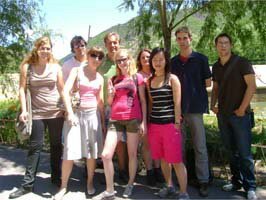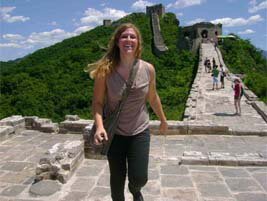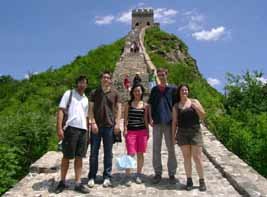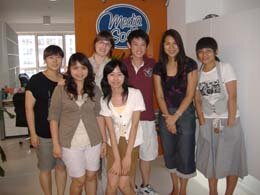|
Global Exchange Newsletter July-September 2008
Welcome to our first newsletter! In order to keep you updated on the Global Exchange experience, we will release new editions throughout the year, featuring new students, events and tools to help you enjoy China!
In This Edition:
- The Impact of the Olympics
- Summer Events
- Announcement: New Service Available:-Online Chinese Instruction
- Interviews with students
- Get to know Global Exchange |
 |
The Impact of the Olympics
For the first time, a city in China is now hosting the Olympics. Beijing has worked for more than 7 years in preparation for the event, making all sorts of improvements. The air quality has improved, and there are fewer cars on the street. We are happy to share our enthusiasm with our current students, who are enjoying the games with us.
It has been exciting to see our subway lines more than double, most recently with the line 10, line 8, and the airport express. Suddenly it seems as if the subway covers the whole city of Beijing.
We are happy to say life in Beijing has become much more convenient. Currently we are enjoying our center's proximity to the number 13 subway line. Our students now have more options for accommodation. Now students who live in the Wangfujing area of central Beijing can easily reach our center.
Networking and Welcome Events
On June 3, we had a Chinese food party in our new office located at Shangdi in the Haidian district. Everyone enjoyed both boiled and steamed dumplings.
Another event was held near the traditional holiday called "Duan Wu" (May 5th on the Chinese calendar). Students enjoyed the taste of a traditional Chinese dish called ¡°Zong Zi¡±. This consists of sweet rice with several different types of stuffing, elegantly wrapped in lotus leaves. It also happened to be a student's birthday, so some teachers and students prepared a birthday cake!
Finally, in the first week of July, we had a small party in a nearby Chinese restaurant. We enjoyed different types of Chinese teas and relaxed with our newly arrived students.
July 12, 2008: Great Wall Tour in Si Ma Tai:
Our center organized a tour of the Great Wall sections of Si Ma Tai, located just outside of Beijing. Visiting Si Ma Tia is an excellent way to see this historic landmark. Visitors are treated with a stunning view of surrounding mountain range, which has lush forests and a river.
 |
|
 |
Here is comments from one of students who were in this tour:
¡° It's a bit further than Badaling, but this makes all the difference when it comes to numbers of tourists. Our group of 7 was able to go wherever we wanted to go without queues or having to negotiate around the huge groups of tourists that I've seen at Badaling. There are also many less souvenir salespeople following you around - I only had one trying to keep up with me.
This section of the wall is also much more interesting. It's the only section that still has the original Ming Dynasty appearance. It's less "restored", and has some fairly steep ascents up the mountain which pays off with excellent views of the wall winding its way over the hills, and views down into the valley where the dam is situated.
We took the following route: Cable car, walk up the track to the to wall, head towards the right and follow the wall all the way to the last accessible tower. We then headed back in the other direction, where some of our group went back down the way we came. The remaining 3 of us continued until we reached the wall overlooking the dam. On the way, I bought a nice little hand made stone "postcard" for my Aunt. Once overlooking the dam, we took the rope way followed by a boat ride to get back to the start. The ropeway is great fun - don't miss it. ¡±
New Service Available: Online Chinese Instruction
Global Exchange is excited to announce the launch of our new language training program: Online Chinese Instruction. Now, utilizing Skype, current university students and professionals can study effectively from the comfort of their homes. This option is an affordable way to begin or continue your instruction without the expense of traveling to China.
Interviews with students
Global Exchange provides a wide variety of relevant experience to all sorts of people. Whether you are a university student, a professional, or retired, we can offer an exciting and productive gateway into China!
Yves Lorand, France
Yves utilized our homestay program in Yantai
- What is your background?
Currently I am 50 years old and don't work any longer. Previously I bought and repaired old buildings in order to rent them out as apartments. I was at the beginner level of Chinese when I worked with Global Exchange.
- What brought you to China, and how long have you been here?
I came for two months to learn Chinese for my pleasure.
- What specific program did you utilize?
The basic one, with 4 hours of private lessons.
- What is life in Yantai like? Is there anything special about it you would like to mention?
I enjoyed life in Yantai very much. The city itself felt new and modern and I was only a 15 minute walk from the seaside! I also enjoyed the food (organic fruits and vegetables, fresh fish and seafood. The home stay family consisted of kind people who were very attentive to my wishes. My teacher was nice, and stayed at home most of the time so we had a lot of time together in addition to regular lessons.
- Is there anything special you could say about Global Exchange?
It was a good experience and a good school, with excellent communication with the staff, and good reactivity when I had any questions or problems.
Greg, Australia
Greg is a returning student who took Chinese language classes in Beijing
- What is your background?
I received a Bachelor Degree in Mechanical Engineering in 1993. I have worked in a range of countries, industries and roles since then. I am currently working for a large Australian consultancy as a project manager for construction, infrastructure, defense, and security projects amongst other things. This is my second experience learning a foreign language. I am a beginner in Chinese.
- What brought you to China, and how long have you been here?
a) Interest in other cultures;
b) Chinese is a common language on global scale;
c) Development in China is very interesting and I wanted to see some of it first-hand. I've been here for nearly four weeks now on this trip. I have also visited China twice before, one in 1984 for 10 days, and once in 2006 for 5 weeks (during which I studied at Global Exchange for 4 weeks).
- What specific programs have you utilized?
Language Basic - twice.
- Is there anything special you could say about Global Exchange?
I like the size of the company. I find they are able to treat me on a personal level, and I am satisfied with the services provided, including the proficiency of the language instructors.
- When are you happiest in China?
When doing Chinese stuff, such as eating at small local restaurants with Chinese people.
Yujing Xue, Duke University, USA
Yujing was in our "Chinese Business Internship" program
- Tell us about yourself (education background, majors, level of Chinese)
My name is Yujing Xue, and I'm currently a third year undergraduate student at Duke University studying biomedical engineering. I was actually born in Jiangsu, China and immigrated to the United States with my parents when I was a toddler. Mandarin Chinese was my first language, but it was quickly replaced by English when I started kindergarten in the States. Although frequently I'd speak English or a mixture of English and Chinese at home, my parents kept speaking Mandarin to me at home. As a result, speaking and understanding conversational Mandarin has never been a big problem for me. However, reading, writing, and expanding my Chinese vocabulary to the level of fluency remained a persistent challenge. During middle school, I attended Chinese school with other Chinese-American kids to improve my Chinese, but I didn't understand how important it was then and didn't study very hard. Now that I'm older, I realize how precious my Chinese heritage is and how important it is for me to master my native language. Global Exchange in Beijing was a big step toward my goal of perfecting my Chinese.
| |
 |
|
- What Global Exchange program did you do? Was it study abroad?
I attended the Global Exchange Business Internship program. It was not study abroad.
- Why did you come to China? What do you find interesting about the country/culture?
I wanted to return to my roots. Even though I had visited relatives in Jiangsu twice before in the past, I felt like I still did not truly know my homeland because I had never lived, studied, or worked in China. The Global Exchange Business Internship was the perfect opportunity for me to do all these things and to discover and get to know China. Especially during the time of anticipation leading up to the Olympics, I was eager to get a taste of the exciting growth that is currently occurring in Beijing. I wanted to learn and improve my Chinese by being immersed in the culture and lifestyle and by talking with my teachers, co-workers, host family, and the new friends that I would meet. I was thrilled that I would be able to intern at a Chinese marketing/PR consulting company. It was a dream come true to learn and use my skills in the Chinese workplace and to experience the entrepreneurial spirit of today's Chinese young professionals. As China continues to emerge as a world superpower, it was extremely important for me to see and understand China's business sector and how it functions and influences the rest of the world. Overall, I saw this trip to China as a fantastic learning opportunity that would undoubtedly challenge me and broaden my global perspective while linking me to my own heritage.
- Do you have any personal or professional goals you are trying to achieve from your experience? Has Global Exchange been particularly helpful in any way?
I am planning to study medicine in the future, so my experience with Global Exchange actually has no direct connection with my professional goals. However, I feel that fluency in Chinese, knowledge of the business world, and a sense of entrepreneurship will be extremely valuable regardless of what I choose to pursue professionally. In this way Global Exchange has been a great help.
- What is your favorite ____ ( Choose one or add your own: Chinese dish, phrase, place in Beijing)?
My favorite place in Beijing is Houhai (ºóº£). No where else have I seen such a classy collection of restaurants, bars, clubs, and shops all surrounding a gorgeous lake. Situated in a historic area of Beijing, Houhai is a unique blend of ancient Chinese culture and modern trendy entertainment. At night, the whole area is lit up beautifully and the air is filled with live music. You can enjoy delicious Chinese cuisine, hang out at the many bars and clubs, or even rent a paddle boat to go out on the lake. Houhai is definitely one of the most amazing hang out spots in Beijing.
Get to know Global Exchange
Teacher Name: Ms. Wang Xiu Feng (Erin)
Position: senior teacher
- Where did you go to university, and what did you study?
I graduated from the Chinese Department of Changchun University, located in the Northeastern province of Jilin.
Do you have a special hobby or passion?
I like bike riding! I love to ride around the city in the evening and look at the city lights at least twice a month. The exercise makes me feel full of life.
How long have you been in Beijing? What do you think of it?
I have lived in Beijing for three years. I like this city. There are a lot of opportunities and challenges in big cities like Beijing. So life is not easy, but it is exciting because there are a lot of chances to do different things. That is very different from small cities, where life can be slow and not much changes.
Do you think Chinese or English is harder to learn?
As a Chinese teacher, I would say the Chinese is harder to learn, particularly for European or American students. This is due to the fundamental difference between Chinese and western languages. Sentences can have different meanings when words are placed in different orders. However, the most difficult part of Chinese isn't the grammar, but instead the individual worlds. Many words are homonyms and close synonyms. This poses the greatest challenge for new Chinese learners.
If you could travel for two weeks for free, where would you go?
If I had two weeks of free time, I would travel to southern China. I am curious about the minorities¡¯ customs, and it is very natural and beautiful.
|